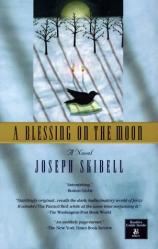Reading Group Guide
Discussion Questions
A Blessing on the Moon

1. How does the author establish the fantastical nature of the novel from its very beginning? Why do you think the author utilized the plot device of turning the Rebbe into a crow? Why does this metamorphosis seem appropriate for the character? How does the first sentence of chapter two, "The Rebbe is not his usual self, that much is clear" (p.8), establish the mood and set up the action for part one of the book?
2. Chaim laments, "Without the moon, who can keep track of the time?" (p. 196). How does the author play with time as the novel progresses? How does this technique affect the way we experience Chaim's story? What is the significance of the 50 years that elapse during the course of the book?
3. Chaim is a man of almost unflinching faith, who believes, "What's forbidden is forbidden" (p. 226) and says, "If the Rebbe insists, who am I to argue?" (p. 219). How does Chaim's adherence to Jewish law both simplify and complicate his existence? What are his feelings about the stringent Hasidic beliefs he witnesses by observing Kalman and Zalman? How does their discussion of whether the Law permits them to take the abandoned boat (pp. 105-109) foreshadow the events of the novel's conclusion?
4. Most of the characters are able to see the dead Chaim, but to others he and his blood are invisible. Who can see him, and who cannot? Why do you think the author decided to make him invisible to some? What is significant about the parts of the story during which Chaim bleeds? How and when are towels used as a ritual for cleansing and healing (see pp. 68, 129, and 243)?
5. What is the nature of the attraction between Chaim and Ola? Why does Chaim succumb to "what is forbidden" in this relationship? Why is he reluctant to reveal to her the truth about death (pp. 41-42)? What are Ola's greatest gifts to Chaim?
6. The themes of abandonment and loss are ubiquitous in the novel, and Chaim often exclaims, "What can God be thinking!" If God could answer Chaim, how do you think their conversation would progress? How would Ola, the Rebbe, Ester, Ida, and others explain to Chaim their own "abandonment" of him?
7. The Hotel Amfortas is a unique and colorful representation of Chaim's idea of paradise. Describe your own version of the ideal "Hotel Amfortas" and the events that would take place there. How do the similarities and differences illuminate the similarities and differences between you and the character of Chaim Skibelski?
8. What are the first clues that something is amiss at the Hotel Amfortas? How does the hotel's deterioration mirror the events and outcome of the Holocaust? What happens to Chaim physically and psychologically as the hotel falls into ruin (pp. 182-187)?
9. Explore the symbolism of the moon's burial beneath layers of corpses and the construction of the scaffolding from human bones held together by "a higher physics of some kind" (p. 234). Who was responsible for pulling the moon down from the sky in the first place? Is there more than one answer to this question?
10. The release of the moon from its burial site is simultaneous with the release of Chaim at the novel's climax. What does this transition require of Chaim, and how does he react at first? Do you think Ola would have been comforted if she had known what happens to Chaim on the last page of the book? Do you think Ola underwent a similar process? Why, or why not?
11. Chaim notes the blood and pockmarks that mar the moon's surface as it is about to be restored to its rightful place: "Forever now, the moon will appear this way, no longer the smooth and gleaming pearl I remember from my youth" (p. 244). How have the events of the Holocaust changed forever the way the world appears, and how might the preceding quotation begin to suggest the feelings of the descendants of those who died at the hands of Hitler's army? What does Chaim mean when he says, "Many worlds have been lost, not simply my own" (p. 210)?
12. While carrying the head of the German soldier, Chaim wonders, "Perhaps I would have been happier being born a wolf" (p. 114). Why does he momentarily feel he would be better off as a vicious animal? What does this fantasy reveal about his feelings toward his killers? About his own character? About his identity as a Jew? Why does he eventually relinquish this fantasy?
A Blessing on the Moon
- Publication Date: April 1, 1999
- Paperback: 272 pages
- Publisher: Berkley Trade
- ISBN-10: 0425167135
- ISBN-13: 9780425167137








